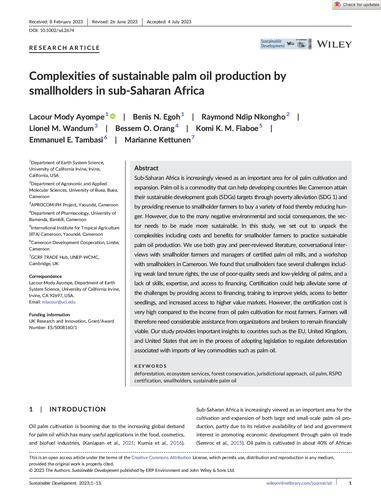Complexities of sustainable palm oil production by smallholders in sub-Saharan Africa
Abstract
Sub-Saharan Africa is increasingly viewed as an important area for oil palm cultivation and expansion. Palm oil is a commodity that can help developing countries like Cameroon attain their sustainable development goals (SDGs) targets through poverty alleviation (SDG 1) and by providing revenue to smallholder farmers to buy a variety of food thereby reducing hunger. However, due to the many negative environmental and social consequences, the sector needs to be made more sustainable. In this study, we set out to unpack the complexities including costs and benefits for smallholder farmers to practice sustainable palm oil production. We use both gray and peer-reviewed literature, conversational interviews with smallholder farmers and managers of certified palm oil mills, and a workshop with smallholders in Cameroon. We found that smallholders face several challenges including weak land tenure rights, the use of poor-quality seeds and low-yielding oil palms, and a lack of skills, expertise, and access to financing. Certification could help alleviate some of the challenges by providing access to financing, training to improve yields, access to better seedlings, and increased access to higher value markets. However, the certification cost is very high compared to the income from oil palm cultivation for most farmers. Farmers will therefore need considerable assistance from organizations and brokers to remain financially viable. Our study provides important insights to countries such as the EU, United Kingdom, and United States that are in the process of adopting legislation to regulate deforestation associated with imports of key commodities such as palm oil.

